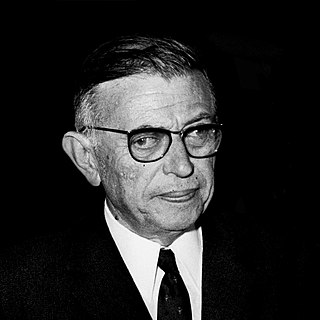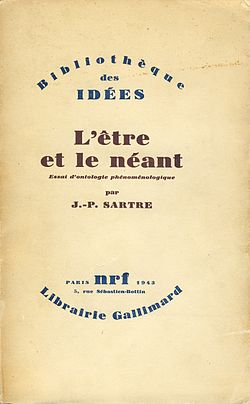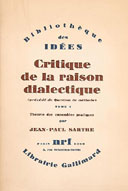Existentialism is a family of philosophical views and inquiry that study existence from the individual's perspective and explore the struggle to lead authentic lives despite the apparent absurdity or incomprehensibility of the universe. In examining meaning, purpose, and value, existentialist thought often includes concepts such as existential crises, angst, courage, and freedom.

Jean-Paul Charles Aymard Sartre was a French philosopher, playwright, novelist, screenwriter, political activist, biographer, and literary critic, considered a leading figure in 20th-century French philosophy and Marxism. Sartre was one of the key figures in the philosophy of existentialism. His work has influenced sociology, critical theory, post-colonial theory, and literary studies. He was awarded the 1964 Nobel Prize in Literature despite attempting to refuse it, saying that he always declined official honors and that "a writer should not allow himself to be turned into an institution."
Truth or verity is the property of being in accord with fact or reality. In everyday language, it is typically ascribed to things that aim to represent reality or otherwise correspond to it, such as beliefs, propositions, and declarative sentences.

Simone Lucie Ernestine Marie Bertrand de Beauvoir was a French existentialist philosopher, writer, social theorist, and feminist activist. Though she did not consider herself a philosopher, nor was she considered one at the time of her death, she had a significant influence on both feminist existentialism and feminist theory.

Being and Nothingness: An Essay on Phenomenological Ontology, sometimes published with the subtitle A Phenomenological Essay on Ontology, is a 1943 book by the philosopher Jean-Paul Sartre. In the book, Sartre develops a philosophical account in support of his existentialism, dealing with topics such as consciousness, perception, social philosophy, self-deception, the existence of "nothingness", psychoanalysis, and the question of free will.

Critique of Dialectical Reason is a 1960 book by the philosopher Jean-Paul Sartre, in which the author further develops the existentialist Marxism he first expounded in his essay Search for a Method (1957). Critique of Dialectical Reason and Search for a Method were written as a common manuscript, with Sartre intending the former to logically precede the latter. Critique of Dialectical Reason was Sartre's second large-scale philosophical treatise, Being and Nothingness (1943) having been the first. The book has been seen by some as an abandonment of Sartre's original existentialism, while others have seen it as a continuation and elaboration of his earlier work. It was translated into English by Alan Sheridan-Smith.

Authenticity is a concept of personality in the fields of psychology, existential psychotherapy, existentialist philosophy, and aesthetics. In existentialism, authenticity is the degree to which a person's actions are congruent with their values and desires, despite external pressures to social conformity. The conscious self comes to terms with the condition of Geworfenheit, of having been thrown into an absurd world not of their own making, thereby encountering external forces and influences different from and other than the Self. A person’s lack of authenticity is considered bad faith in dealing with other people and with one's self; thus, authenticity is in the instruction of the Oracle of Delphi: “Know thyself.” Concerning authenticity in art, the philosophers Jean Paul Sartre and Theodor Adorno held opposing views and opinions about jazz, a genre of American music; Sartre said that jazz is authentic and Adorno said that jazz is inauthentic. Many musical subcultures require artistic authenticity, lest the community consider an artist to be a poseur for lacking authenticity ; artistic authenticity is integral to many genres of music, including but not limited to genres of rock, club music, and hip-hop.
Praxis is the process by which a theory, lesson, or skill is enacted, embodied, realized, applied, or put into practice. "Praxis" may also refer to the act of engaging, applying, exercising, realizing, or practising ideas. This has been a recurrent topic in the field of philosophy, discussed in the writings of Plato, Aristotle, St. Augustine, Francis Bacon, Immanuel Kant, Søren Kierkegaard, Ludwig von Mises, Karl Marx, Antonio Gramsci, Martin Heidegger, Hannah Arendt, Jean-Paul Sartre, Paulo Freire, Murray Rothbard, and many others. It has meaning in the political, educational, spiritual and medical realms.
Bill, Willy or William Schroeder or Schröder may refer to:

Barbet Schroeder is an Iranian-born Swiss film director and producer who started his career in French cinema in the 1960s, working with directors of the French New Wave such as Jean-Luc Godard, Jacques Rivette and Eric Rohmer.
Michael Mann FBA is a British emeritus professor of sociology at the University of California, Los Angeles (UCLA) and at the University of Cambridge. Mann holds dual British and United States citizenships.

Bad faith is a sustained form of deception which consists of entertaining or pretending to entertain one set of feelings while acting as if influenced by another. It is associated with hypocrisy, breach of contract, affectation, and lip service. It may involve intentional deceit of others, or self-deception.
Existential phenomenology encompasses a wide range of thinkers who take up the view that philosophy must begin from experience like phenomenology, but argues for the temporality of personal existence as the framework for analysis of the human condition.

Nausea is a philosophical novel by the existentialist philosopher Jean-Paul Sartre, published in 1938. It is Sartre's first novel.
Feminism is a collection of movements aimed at defining, establishing, and defending equal political, economic, and social rights for women. Existentialism is a philosophical and cultural movement which holds that the starting point of philosophical thinking must be the individual and the experiences of the individual, that moral thinking and scientific thinking together are not sufficient for understanding all of human existence, and, therefore, that a further set of categories, governed by the norm of authenticity, is necessary to understand human existence. This philosophy analyzes relationships between the individual and things, or other human beings, and how they limit or condition choice.
In existentialism, bad faith is the psychological phenomenon whereby individuals act inauthentically, by yielding to the external pressures of society to adopt false values and disown their innate freedom as sentient human beings. Bad faith also derives from the related concepts of self-deception and ressentiment.
The proposition that existence precedes essence is a central claim of existentialism, which reverses the traditional philosophical view that the essence of a thing is more fundamental and immutable than its existence. To existentialists, human beings—through their consciousness—create their own values and determine a meaning for their life because the human being does not possess any inherent identity or value. That identity or value must be created by the individual. By posing the acts that constitute them, they make their existence more significant.
Buddhist thought and Western philosophy include several parallels.
William Ralph Schroeder is an American philosopher and emeritus Professor of Philosophy at the University of Illinois at Urbana-Champaign. He is known for his expertise on continental philosophy and ethics. He has authored several books about philosophy.
The Childhood of a Leader is a short story or novella of a little over a hundred pages by Jean-Paul Sartre. It is the final story in Sartre's collection that reflects a significant change from non-existence to existence through chronicling the life of Lucien Fleurier since he was a child until he became an anti-Semitic Camelot who believes that he can become a real leader. The work was published in 1939 with four other short stories in a collection entitled The Wall.







